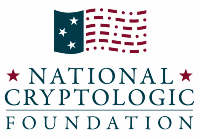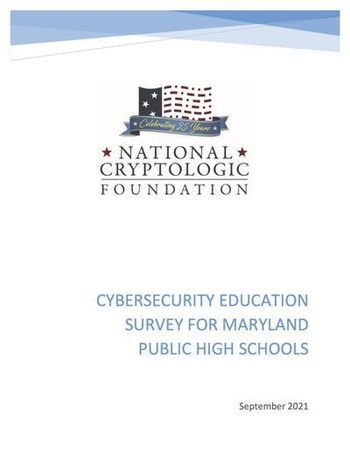NCF Cybersecurity Education Survey for Maryland Public Schools (Sept 2021)
In early November 2021, the National Cryptologic Foundation (NCF) announced the finalization of a report regarding the 2021 NCF Cybersecurity Education Survey for Maryland Public High Schools. Through this survey, the Foundation hoped to gauge how well the career field of cybersecurity is understood and what the challenges are in developing high school courses and programs to better prepare students for cybersecurity degrees and careers. As cybersecurity is a growing industry worldwide, cybersecurity education is a critical national imperative, especially at the secondary level. The report documents responses to the survey, performs some analysis of these responses, and provides some recommendations for a path forward. The full PDF report is available to view by clicking on the document image above. Or click here.
Background
In collaboration with the Maryland State Department of Education (MSDE), the Maryland Center for Computing Education (MCCE), the University of Maryland Global Campus (UMGC), and the National Security Agency (NSA), the National Cryptologic Foundation (NCF) conducted a survey to solicit inputs from all Maryland county and city school districts to advance Maryland cybersecurity education. During the Spring Semester 2021, an online/automated survey was created and made available to the 24 Maryland District Administrators for subsequent dissemination to the teachers, administrators, and counselors within each of their school systems.
The Results
One of the more surprising responses from teachers and administrators was the need for awareness building – what cyber is and the breadth of jobs. Teachers and counselors listed various reasons for low student interest in cyber topics, such as lack of knowledge about the topic, lack of exposure to cybersecurity topics due to no computer science lab or courses, and no access to computers or laptops.
The most resounding (and consistent) response from all three groups was the need for additional funding. Professional development and cyber training/certifications for teachers and IT admin, as well as STEM cybersecurity curriculum were listed as needed resources for their schools in cybersecurity instruction.
Going Forward
Based upon the results of the survey, the NCF compiled a list of short and long-term recommendations. Included in the short-term recommendations are initiatives such as continuing with the development and dissemination of the cybersecurity curriculum through our partner Teach Cyber, increasing the level of online NCF Cyber Chats via Nepris, and further distribution of the cybersecurity booklet for students. Long-term goals include developing another cybersecurity booklet containing topics recommended by educators during the survey, and developing professional development for teachers in cybersecurity based upon the NCF's Cybersecurity Curriculum Guidelines and Teach Cyber's high school materials.
Special Thanks
The National Cryptologic Foundation appreciates the help of those who made this study possible with particular thanks to Dr. Rita Doerr who spearheaded and guided the effort along with Dr. Gregory Von Lehmen and Dr. Loyce Pailen from our strategic partner at the University of Maryland Global Campus (UMGC).
Learn more about the NCF's Education Program and Education Partnership Programs.


